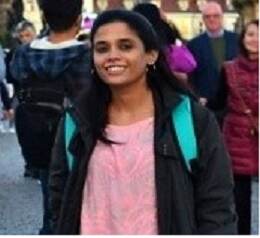GLOBAL WOMEN'S FORUM
THEME: "WOMEN: INFLUENCING THE GLOBAL"
 23-24 Sep 2024
23-24 Sep 2024  Village Hotel Changi, Singapore
Village Hotel Changi, Singapore THEME: "WOMEN: INFLUENCING THE GLOBAL"
 23-24 Sep 2024
23-24 Sep 2024  Village Hotel Changi, Singapore
Village Hotel Changi, Singapore 
Ma Foundation, India
Title: Empowering Rural Women through the "Ma Ki Roti" Initiative: A Holistic Development Model
Tarang is a development professional with over 16 years of experience in program management, specializing in health systems and policy advocacy. As a trained development professional, she has worked with government bodies, think tanks, international agencies, and grant-making organizations. Tarang has contributed to several flagship initiatives in India focused on gender equality and rights. Over the past nine years, she has been actively involved in programs aimed at creating economic equality for women. Her work has been published in national and international journals. Furthermore, she has actively participated in people-based movements.
Ma Foundation, based in Mumbai, serves marginalized women and children in remote areas of India by implementing programs to eradicate poverty, improve healthcare, and enhance educational opportunities. Central to this mission is the "Ma Ki Roti" initiative, which transforms impoverished mothers into mini-entrepreneur.
The program targets impoverished women in India's remote areas, encouraging them to establish canteens as part of a skilling and entrepreneurship initiative. Participants learn culinary and entrepreneurial skills, selling subsidized meals within their communities. Starting from one center with 12 mothers, the program has expanded in three years to 77 centers across 11 states, benefiting over 690 mothers and providing meals to more than 350,000 underprivileged individuals.
"Ma Ki Roti to Samaj Ki Beti" is a structured three-year model: the first year focuses on infrastructure, food subsidies, and training; the second year gradually reduces subsidies; and the third year emphasizes guidance and motivation, empowering women to become self-reliant entrepreneurs. Each canteen functions as an on-the-job training center, enhancing participants' financial and entrepreneurial skills.
The program significantly improves communication skills (67%), financial skills like accounting (69%), and knowledge about nutrition and hygiene practices. Nearly 98% of participants have learned to operate their bank accounts. Economic empowerment is evident, with each woman now earning a monthly income ranging from INR 3,500 to INR 4,500 on average. These women are building progressive families and making informed decisions on nutrition, healthcare, and education, with over 75 %women investing in their children's education, particularly for girls.
The results clearly indicate that empowering women with skills and providing them access to economic freedom leads to holistic development.